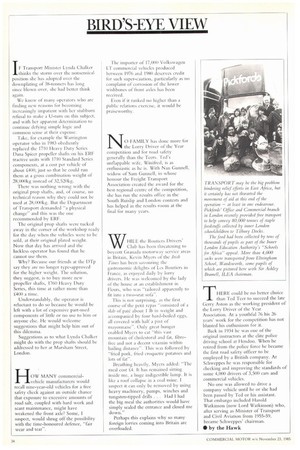BIRD'S-EYE VIEW
Page 36

If you've noticed an error in this article please click here to report it so we can fix it.
IF Transport Minister Lynda Chalker thinks the storm over the nonsensical position she has adopted over the downplating of 38-tonners has long since blown over, she had better think again.
We know of many operators who are finding new reasons for becoming increasingly impatient with her stubborn refusal to make a U-turn on this subject, and with her apparent determination to continue defying simple logic and common sense at their expense.
Take, for example the Warrington operator who in 1983 obediently replaced the 1710 I leavy Duty Series Dana Spicer propeller shafts on his ERF tractive units with 1710 Standard Series components, at a cost per vehicle of about C400, just so that he could run them at a gross combination weight of 28.000kg instead of 32,520kg.
There was nothing wrong with the . original prop shafts, and, of course, no technical reason why they could not be used at 28,000kg. But the Department of Transport demanded "a physical change" and this was the one recommended by ERF.
The original prop shafts were tucked away in the corner of the workshop ready for the day when the vehicles were to be sold, at their original plated weight. Now that day has arrived and the luckless operator has found that he cannot use them.
Why? Because our friends at the DTp say they are no longer type-approved for the higher weight. The solution, they suggest, is to buy more new propeller shafts, 17()0 Heavy Duty Series, this time at rather more than C400 a time.
Understandably, the operator is reluctant to do so because he would be left with a lot of expensive part-used components of little or no use to him or anyone else. He would welcome suggestions that might help him out of this dilemma.
Suggestions as to what Lynda Chalker might do with the prop shafts should be addressed to her at Marsham Street, London.
HOW MANY commercialvehicle manufacturers would recall nine-year-old vehicles for a free safety check against an outside chance that exposure to excessive amounts of road salt, coupled with hard work and scant maintenance, might have
weakened the front axle? Some, I suspect, would shrug off the possibility with the time-honoured defence, "fair wear and tear". The importer of 17,000 Volkswagen IT commercial vehicles produced between 1976 and 1980 deserves credit for such super-caution, particularly as no complaint of corrosion of the lower wishbones of front axles has been received.
Even if it ranked no higher than a public relations exercise, it would be praiseworthy.
No FAMILY has done more for the Lorry Driver of the Year competition and for road safety generally than the Teers. Ted's unflappable wife, Winifred, is as enthusiastic as he is. With Nan Gunnell, widow of Sam Gunnell, in whose honour the Freight Transport Association created the award for the best regional centre of the competition, she has run the results office in the South Ruislip and London contests and has helped in the results room at the final for many years.
WII1LE the Routiers Drivers' Club has been threatening to boycott Granada motorway service areas in Britain, Kevin Myers of the frith Times has been savouring the gastronomic delights of Les Routiers in France, as enjoyed daily by lorry drivers. He was welcomed by the lady of the house at an establishment in Fleurs, who was "tailored apparently to fit into a two-seat sofa".
This is not surprising. as the first course of the petit reps "consisted of a slab of pat6 about 1 lb in weight and accompanied by four hard-boiled eggs, all covered with half a pint of mayonnaise". Only great hunger enabled Myers to eat "this vast mountain of cholestoral and fat, fibrefree and not a decent vitamin within hailing distance". This was followed by "fried pork, fried croquette potatoes and lots of fat".
Breathing heavily, Myers added: "The meal cost $:.4. It has remained sitting inside me, a huge indigestible lump. It is like a roof collapse in a coal mine. 1 suspect it can only be removed by using heavy machinery, pumps, winches and tungsten-tipped drills . . . Had I had the big meal the authorities would have simply sealed the entrance and closed me down."
Perhaps this explains why so many foreign lorries coming into Britain are overloaded.
TRANSPORT may be the big problem hindering relief efforts in East Africa, but if certainly has not thwarted the movement of aid at this end of the operation — at least in one endeavour. Pickfords' Office and Commercial branch in London recently provided free transport to help convey 80,000 tonnes of staple foodstuffs collected by inner London schoolchildren to Tilbury Docks.
The food had been collected by tens of thousands of pupils as part of the Inner London Education Authority's "Schools .for Africa" appeal. More than 4,000 sacks were transported from Ehringham School, Wandsworth, some pupils of which are pictured here with Sir Ashley Bramell, ILEA chairman.
THERE could be no better choice than Ted Teer to succeed the late Gerry Aston as the working president of the Lorry Driver of the Year Association. At a youthful 76 his 26 years' work for the competition has not blunted his enthusiasm for it.
Back in 1934 he was one of the original instructors at the elite police driving school at ilendon. When he retired from the police force he became the first road safety officer to be employed by a British company. At Schweppes he was responsible for checking and improving the standards of some 4,000 drivers of 3,500 cars and commercial vehicles.
No one was allowed to drive a company vehicle until he or she had been passed by Ted or his assistant. That embargo included Harold Watkinson (now Lord Watkinson) who, after serving as Minister of Transport and Civil Aviation from 1955-59, became Schweppes' chairman.
• by the Hawk












































































































































